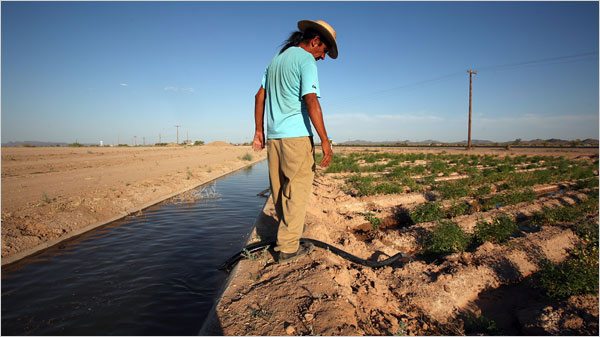
November 30, 2017; News Deeply, “Water Deeply”
“On Monday, November 27, the United States Supreme Court let stand a California federal appellate court decision that could chart a new course for Native American tribal groundwater rights,” reports Debra Utacia Krol in News Deeply.
The case was Agua Caliente Band v. Coachella Valley Water District. Last March, Krol reports, a three-judge panel of the U.S. Court of Appeals for the Ninth Circuit ruled that the Cahuilla’s water rights include an aquifer that lies beneath the Palm Springs-based tribe’s 31,500-acre reservation.
“The United States impliedly reserved appurtenant water sources, including groundwater, when it created the Tribe’s reservation in California’s arid Coachella Valley,” the judges ruled.
The court’s decision is based on the Winters Doctrine, which, Krol explains, “springs from a 1908 Supreme Court decision that reserves the federal government’s right to reserve sufficient water for Indian reservations’ needs.” The decision in the Agua Caliente case effectively affirms that tribes have a federally reserved right to groundwater, at least within Ninth Circuit states. In addition to California, the Ninth Circuit includes Alaska, Arizona, Hawaii, Idaho, Montana, Nevada, Oregon and Washington.
Krol writes that, “The Agua Caliente case was the culmination of a struggle over nearly two decades.” Four years ago, Agua Caliente filed their suit against the Coachella Valley Water District (CVWD) and the Desert Water Agency to “gain ownership and control of a portion of the aquifer.”
Sign up for our free newsletters
Subscribe to NPQ's newsletters to have our top stories delivered directly to your inbox.
By signing up, you agree to our privacy policy and terms of use, and to receive messages from NPQ and our partners.
The water levels in the 65-mile-long aquifer have fallen 55 feet over the past 40 years due to overuse. The water agencies’ solution was to direct untreated Colorado River water into the aquifer through a process that is called “artificial replenishment.”
The water districts in the Palm Springs area claim the water quality is sound. However, Agua Caliente and many other water agencies have concerns about Colorado River water quality. Krol notes that, “Some of the region’s biggest water agencies—the Central Arizona Project (CAP), the Southern Nevada Water Authority and the Metropolitan Water District of Southern California—formed the Lower Colorado River Water Quality Partnership to address issues that impact Colorado River quality, including dissolved salts, selenium, phosphorus, nitrate, pathogens, pharmaceutical and personal care products, perchlorate, chromium 6 and uranium.” In a white paper, Krol adds, “CAP officials determined that these contaminants could pose an ‘immediate or long-term threat to the river’s water quality.’”
“The case is going to be very important for any state within the Ninth Circuit,” says Judith Dworkin, an American Indian law attorney in Phoenix. Dworkin, notes Krol, has worked on American Indian water rights settlement and litigation, but has not been involved in the Agua Caliente case. Arizona, Dworkin adds, however, will feel less impact “as the Arizona Supreme Court has already determined that [an American Indian nation] may have a federal reserved right to groundwater if surface waters are inadequate to accomplish the reservation’s purposes.”
While Agua Caliente’s court victory has established its aquifer water rights, The Ninth Circuit Court still needs to hold a second trial to determine how much of the aquifer belongs to Agua Caliente. The second trial will involve so-called “Phase 2 Legal Issues—the correct standard or methodology for quantifying the tribe’s share, whether the federal reserved or Winters water right carries with it a right to water of a certain quality and whether the tribe owns the groundwater storage space, or pore space, under its reservation,” says Kate Anderson, director of public relations for Agua Caliente.
For Agua Caliente, the legal ruling allows them to “explore the range of water sources available to…[develop] a long-term plan,” says Dworkin. For water agencies, “it may require those with state water rights to establish working relationships with [American Indian nations] to develop aquifer management programs.”—Steve Dubb













